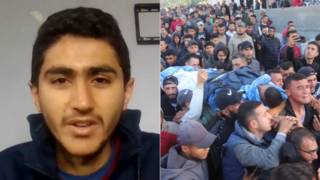HeadlinesJuly 21, 2017
Bloomberg: Special Counsel Investigating Trump-Russia Business Ties
The special counsel tasked with investigating ties between Donald Trump’s campaign and Russia’s government during last year’s election is examining a broad range of transactions involving Trump’s businesses, as well as those of his associates. That’s according to Bloomberg News, which reported Thursday former FBI chief Robert Mueller’s probe will examine a series of real estate deals with Russian investors, as well as the 2013 Miss Universe pageant in Moscow. The probe has also reportedly absorbed a money laundering investigation into Trump’s former campaign chair Paul Manafort. News of the special counsel’s wider investigation came after President Trump left open the possibility that he could order the Justice Department to fire Robert Mueller. Trump told The New York Times Mueller would be crossing a “red line” if he investigates Trump family finances. The Times reports Trump’s lawyers and aides are working to dig up dirt on Mueller and his team in an effort to discredit the investigation. Meanwhile, The Washington Post reports Trump was especially upset after learning Mueller would have access to years’ worth of Trump’s tax returns, which the president has refused to make public. The Post says Trump is also considering future pardons for his aides and family—and possibly even himself. This all comes amid a shakeup of the legal team representing President Trump. Marc Kasowitz will no longer serve as Trump’s lead personal attorney. The move follows an expletive-laden series of threats Kasowitz sent by email to a stranger who said he should resign.
The Independent: Over 40,000 Civilians Died in Battle for Mosul, Iraq
In Iraq, newly revealed intelligence reports claim more than 40,000 civilians died in the U.S.-led battle to retake Mosul from ISIS—a total far higher than previously reported. Writing for The Independent, Patrick Cockburn cited intelligence reports seen by a top Kurdish official, who said previous estimates of the deaths were low because thousands of bodies remain buried under the rubble. The battle, which wrapped up earlier this month, began last October and lasted months longer than the siege of Stalingrad during World War II.
Civil Liberties Groups Decry Bills to Criminalize Boycotting Israel
Back in the U.S., civil rights groups are warning a pair of bipartisan bills would criminalize free speech and peaceful protests. The Israel Anti-Boycott Act would make it a felony for U.S. citizens to support boycotts of Israel and Israeli settlements—punishable by at least a quarter-million-dollar fine, with a maximum penalty of two decades in prison and a fine of $1 million. So far, 43 senators and 234 representatives across both sides of the aisle support the legislation. The American Israel Public Affairs Committee, or AIPAC, reportedly helped craft the bill and has made its passage one of the group’s top lobbying priorities for the year. In a letter on Monday, the American Civil Liberties Union wrote, “We take no position for or against the effort to boycott Israel or any foreign country, for that matter. However, we do assert that the government cannot, consistent with the First Amendment, punish U.S. persons based solely on their expressed political beliefs.” The attempt to criminalize the BDS movement comes amid a deepening humanitarian crisis in the Gaza Strip, where the United Nations said this month conditions have become “unlivable.”
Senate Committee Advances Nomination of Christopher Wray as FBI Chief
The Senate Judiciary Committee voted 20-0 Thursday to recommend President Trump’s nominee replace James Comey as head of the FBI, clearing the way for Christopher Wray to be approved by the full Senate. Wray served as assistant attorney general under George W. Bush from 2003 to 2005, at a time when the Justice Department’s Office of Legal Counsel signed off on the torture of prisoners in CIA and military custody.
Justice Department to Revive Civil Asset Forfeitures by Police
The Justice Department said this week it will allow state and local police departments to seize cash and property from people suspected of crimes—even if they haven’t been convicted. Attorney General Jeff Sessions says the policy, called “civil asset forfeiture,” is an important tool for fighting crime. The practice was largely ended by the Obama administration after investigations showed local police routinely stopped drivers for minor traffic infractions and seized billions of dollars’ worth of property. In some cases, departments used the assets to pay for luxury cars and high-powered weapons. The ACLU has called civil asset forfeiture a violation of due process that disproportionately targets communities of color.
Senate Bill Would Reform Money Bail System
On Capitol Hill, a pair of senators introduced a bill Thursday seeking to reform states’ money bail systems, which leave nearly a half-million Americans in jail each day simply because they are unable to pay their way out. The legislation by Republican Rand Paul of Kentucky and Democrat Kamala Harris of California would prod states to move away from the current money bail system and toward a system that allows lower-income people to go free as they await trial.
Another Kalief Browder? Bronx Teen Seeking Trial Languishes at Rikers
Meanwhile, in New York City, civil rights activists are demanding justice for a Bronx teenager who’s been held at the notorious Rikers Island jail while awaiting trial for a 2015 crime he says he did not commit. Prosecutors say 18-year-old Pedro Hernandez fired a shot that struck another teen in the leg, even though the victim and eight other teens who witnessed the shooting say Hernandez is innocent. Hernandez has turned down a plea deal that would see him released on five years’ probation. He’s insisting on a trial by jury, but scheduling conflicts have pushed a trial date past Labor Day. Hernandez has been in jail since July of 2016. Hernandez hopes to be released by September 1 in order to accept a full college scholarship. His family has launched a crowdfunding campaign to raise the $250,000 needed to bail him out. Hernandez’s plight has drawn comparisons to the case of Kalief Browder, another Bronx teen, who committed suicide in 2015 at the age of 22 after being held at Rikers for nearly three years without trial for a crime he did not commit.
Senate Confirms Judge John K. Bush, Who Compared Abortion to Slavery
The Senate on Thursday voted 51-47 along party lines Thursday to confirm Judge John K. Bush for a lifetime appointment to the 6th U.S. Circuit Court of Appeals. Bush has a long history of homophobic and sexist comments, and has compared abortion to slavery. Bush has also used a pseudonym to post right-wing blog entries denying the science of climate change and repeating the false claims of so-called “birthers,” who say President Obama was not born in the United States.
ExxonMobil Fined $2M for Russia Sanctions Breach Under CEO Tillerson
The U.S. Treasury Department has fined ExxonMobil $2 million for violating U.S. sanctions against Russia three years ago, when Secretary of State Rex Tillerson served as the oil company’s CEO. The Treasury said ExxonMobil showed “reckless disregard” for U.S. law in 2014 when it signed contracts with Russian oil magnate Igor Sechin to develop offshore reserves in the Arctic. The move violated sanctions placed on Russia after it invaded Ukraine and annexed the Crimean peninsula. Tillerson said at the time his company opposed Russia sanctions, calling them “ineffective.” At the State Department Thursday, spokesperson Heather Nauert was asked whether Tillerson had changed his views on Russian sanctions.
Heather Nauert: “This all predates his time here at the Department of State.”
Matthew Lee: “I understand that.”
Heather Nauert: “And so, I’m going to refrain from giving any comment on that at this time.”
Matthew Lee: “I understand this predates his time as secretary of state, but now he is in a position in which he is part of the team that is supposed to enforce sanctions, not violate them or allow others to violate them, so I think it’s relevant to know what he thinks about this decision today.”
Heather Nauert: “I think—I will say this. The secretary continues to abide by his ethical commitments, including that recusal from Exxon-related activities.”
Secretary of State Tillerson is known to have close ties to Russian President Vladimir Putin, who awarded Tillerson the country’s Order of Friendship decoration in 2013. The Treasury Department’s $2 million fine against ExxonMobil was the maximum amount allowed by law. It represents just over two hours’ profit for the oil giant.
Activists Demand End to U.S. Support for Bloody Philippines Drug War
In the Philippines, President Rodrigo Duterte has asked Congress to extend martial law on the southern island of Mindanao, where government forces have been battling ISIS-allied militants in the city of Marawi. The conflict has killed more than 500 people and displaced over 200,000 since fighting began in May. Meanwhile, in Washington, D.C., a congressional human rights panel heard testimony Thursday from activists who warn Filipino security forces and vigilantes have killed more than 7,000 suspected drug users and dealers since Duterte launched his so-called war on drugs last June. This is Ellecer Carlos of the iDefend human rights coalition.
Ellecer Carlos: “Our daily documentation and monitoring work at the very affected communities confirm, without a shadow of a doubt, that President Duterte and other high officials of the land, having had to find a particular section of Philippine society worthy of elimination, have effectively put in place a de facto social cleansing policy, whereby police and vigilantes are not only encouraged, but rewarded and forced, to commit extrajudicial killings.”
Congressmember James McGovern, a Democrat from Massachusetts, said he was troubled by reports that President Duterte is planning to travel to Washington this fall for talks with President Trump.
Rep. James McGovern: “A man with the human rights record of President Duterte should not be invited to the White House. And if he comes, I will lead the protest, because, again, I mean, we ought to be on the side of advocating for human rights, not explaining them away.”
In April, President Trump called Duterte and invited him to the White House. In the transcript of their conversation leaked by The Intercept, Trump said, “I just wanted to congratulate you because I am hearing of the unbelievable job on the drug problem.”
Poland: Protests Erupt as Ruling Party Moves to Control Courts
In Poland, thousands of protesters took to the streets of the capital Warsaw and other cities Thursday, ahead of a vote scheduled today by the ruling Law and Justice party on a bill that would let Parliament appoint Supreme Court judges. Protesters say the measure would end the separation of powers between the executive and the judiciary.
Zbyszek: “Elections took place democratically, but their governing breaks the law, breaks the constitution, so the democracy in Poland practically dies.”
Andrzej: “This new law on the courts is definitely a step in the wrong direction. That is why we want the president to veto these bills.”
In Brussels, the European Union said it was alarmed by the legislation and was considering bringing unprecedented sanctions against one of its member states due to potential human rights abuses.
Morocco: Demonstrators Defy Protest Ban to Demand Reforms
In Morocco, riot police used clubs and tear gas to scatter hundreds of people marching through the streets of al-Hoceima Thursday, as they defied a government ban on demonstrations to protest corruption and underdevelopment. The protests were the largest seen in Morocco since last October, when thousands turned out in cities across Morocco after the death of a fish seller who was crushed in a garbage truck while trying to retrieve fish confiscated by police. The death became the rallying point for a wider movement for economic justice and civil liberties in the kingdom.
Two Dead, Hundreds Injured as Earthquake Strikes Off Turkish Coast
In the Mediterranean, a strong earthquake rattled parts of Turkey and Greece in the early morning hours Friday, killing at least two people and injuring hundreds. The 6.5-magnitude quake was centered just south of the Turkish resort town of Bodrum. It collapsed nearby buildings and sparked a small tsunami that flooded coastal communities.
Report: Trump to Name Coal Industry Lobbyist as EPA 2nd-in-Command
President Trump is set to name coal industry lobbyist Jeff Holmstead as second-in-command at the Environmental Protection Agency, according to the news site Axios. Since 2007, Holmstead has represented coal, railroad and utility companies as a partner at the powerful firm Bracewell LLP on K Street in Washington, D.C. Holmstead is also a former staffer to Senator James Inhofe of Oklahoma, a prominent climate change denier.
Haitian Immigrant Jean Montrevil Remains Free After ICE Check-in
And in New York City, Haitian immigrant Jean Montrevil walked free from a Manhattan federal building Thursday after ICE immigration officials ordered him to check in for a meeting that could have ended in his deportation. Jean Montrevil came to the U.S. from Haiti with a green card in 1986 at the age of 17. Last month, when he went to his first check-in under President Trump, he was detained, handcuffed, processed to be deported, until calls from his supporters apparently prompted his release. Click here for a full interview with Jean Montrevil and his daughter and lawyer.
Most popular
- 1
- 2
- 3
- 4
Non-commercial news needs your support
Please do your part today.











Media Options